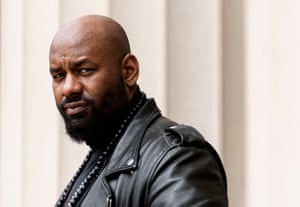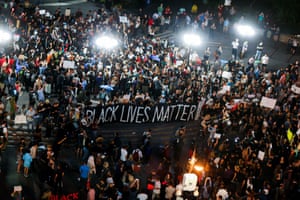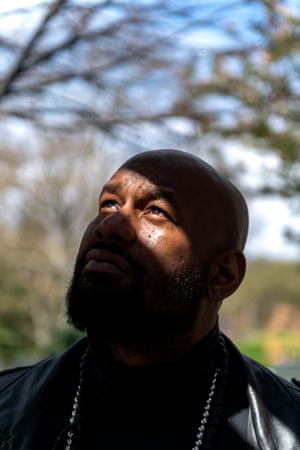‘I ain’t voting till black lives matter’: what does an activist’s radical strategy mean for 2020?
Walter ‘Hawk’ Newsome has built a campaign on encouraging black people to withhold their votes until black issues are addressed. Will it change this year’s election?

Photograph: Michael Noble Jr/The Guardian
Death was the catalyst for Walter “Hawk” Newsome’s most contentious idea. It came to him during the first few days of July in 2016. This was the week that a Minnesota police officer shot 32-year-old Philando Castile five times and killed him in his car; an off-duty New York police officer killed 37-year-old Delron Dempsey in front of his family; and two Louisiana cops fatally shot Alton Sterling six times.
These extrajudicial slayings bedeviled Newsome, who spent his youth being terrorized by the NYPD in the Bronx. Despite the Democratic politicians he had canvassed and campaigned for – from Bloomberg before his “stop and frisk” days to Barack Obama – the situation didn’t seem to get better. Blacks were still being killed by the police at a disproportionate rate.
On that dog day of summer, Newsome decided to take a walk, beginning in Lower Manhattan near Wall Street. By the time he’d gotten Uptown, sweaty and crying, he arrived at a conclusion that might have seemed incongruous, but was grounded in its own fascinating logic. “I thought to myself, ‘Fuck this! Black people shouldn’t vote.”
This sentiment blossomed into I Ain’t Voting Until Black Lives Matter, a meteoric and strange campaign during the 2016 presidential election in which Newsome and a cadre of activists implored blacks to withhold their votes until a candidate adopted policies against police brutality, such as independent prosecutors for police misconduct and jail time for cops who falsified reports.
It’s a campaign that Newsome said has been vindicated by the country’s embrace of progressive politics in recent years. But would it apply to this year’s election?

Black Americans have been loyal to the Democrats for years. Since 1964, Democratic presidential candidates have received at least 80% of the black vote. However, as Princeton political scientist Paul Frymer describes, this loyalty can devalue the concerns of blacks and give swing voters more power.
“When Democrats talked to gay people, they got marriage equality. When Dems talked to immigrant communities, they got Daca. But when it is black people, we get jive talk and the electric slide,” said Newsome, the 42-year-old founder of Black Lives Matter of Greater New York.
To launch his campaign, Newsome reached out to actor and rapper Nick Cannon, who had released the viral song Too Broke to Vote. They chose the Republican national convention to debut, because, “the white supremacists said that [Black Lives Matter] better not show up”. Cannon supported Newsome and 11 of his followers with banners, T-shirts, a van and a house. They marched and held a news conference, gaining some attention.
But at the Democratic national convention the following week, there was backlash. “Older blacks thought that I was dishonoring MLK,” Newsome said. “But he fought for the power of the vote, not for it to be a popularity contest.” Newsome’s own mother later told him that she thought he’d “lost his mind”, and some of his politically minded peers in the Bronx hosted small-scale counter-demonstrations.
Newsome stuck to his convictions. He believed Hillary Clinton’s history of backing the 1994 crime bill, which expanded the death penalty and lengthened prison sentences, and the time she referred to black young men as “superpredators” made her symbolic of everything he protested against. On 8 November, he wrote in his own name on his presidential ballot. “‘I only wish that more people would have stood with us. It might have forced Hillary to do more to draw people to the polls,” he said.
Like his I Ain’t Voting initiative, Newsome is polarizing – even within the Black Lives Matter movement. He’s been criticized for speaking at a Trump rally. While his videos debating conservatives like Tomi Lahren go viral, and he’s a regular face on CNN and BET, he has a history with alcoholism and domestic abuse. “I had to look at myself and say, ‘You are a toxic individual and you need to change,’” he said. Newsome has made public apologies, is four years sober, and participates in therapy, but some have been reluctant to work with him.
Bertha Lewis, the 69-year-old organizer, was one of those suspicious activists. She said she would come to his demonstrations, but remain in the background to observe. “He’s followed the credo of ‘I can show you better than I can tell you,’” she said. “So he’s just kept it moving, and people have had to give him a grudging respect for that.”
While Newsome is an outlier, though, he’s not alone in encouraging blacks to hold their votes for ransom. In 1924, in the shadow of strict loyalty to the Republican party following the American civil war, activist James Weldon Johnson asked, “How can the Negro expect any worthwhile consideration for his vote as long as politicians are always reasonably sure as how it will be cast?”

In 1965, months before the Democrats would secure the black vote for generations with the Voting Rights Act, Malcolm X implored blacks to treat their ballots like bullets and only use them when there was a target within reach.
And during the 2016 election, Fredrick C Harris, Columbia University’s director of the Center of African American Politics, and Eddie S Glaude, chairman of Princeton University’s department of African American studies, crafted the Blank-Out Campaign, which was introduced in a Time op-ed. It called for blacks to leave their presidential ballots blank in red states.
They hoped this would force politicians to “notice that black voters are more than cattle chewing cud, to be herded to the polls”. But the audacious essay was mostly ignored or criticized. Social justice activist Bill Fletcher Jr called the proposed tactic a “cherry bomb” because it created noise, “while producing nothing but smoke”.
Looking back, the 2016 election saw the first decline in black voter turnout in 20 years. In trying to explain the downturn, pundits have cited everything from increased restrictions such as voter ID laws to the disinformation efforts of Russian operatives, whose chief target was blacks. The Russians used Facebook pages with misleading names like “Black Matters” to encourage blacks not to vote – a fact some believe reflects the abject foolishness of Newsome’s efforts.
Newsome disagrees. “The Russians saw what I saw – that the Democrats were disregarding blacks,” he said. “But they were trying to discourage … I was telling people to make politicians work for your vote.”
While “I Ain’t Voting” didn’t galvanize many voters, Newsome believes that its spirit made it a success. Both parties have prioritized recapturing the more than 765,000 eligible black voters who sat out of the 2016 election – whether it’s presumptive nominee Joe Biden pledging to nominate a black woman to the supreme court or Donald Trump talking about criminal justice.
Newsome also sees a Trump presidency as a “curse and a gift” that opened a lane for radical politics. For him, this is embodied in the rise of politicians like the New York US representative Alexandria Ocasio-Cortez, for whom his group members were early supporters. And the early success of Senator Bernie Sanders.
While Sanders failed to get the Democratic nomination, largely thanks to his inability to rouse support from older blacks, his presence has pushed the Democratic frontrunner Joe Biden, a shepherd of racist crime bills in the 90s, to a more progressive criminal justice platform that includes a $300m grant for racially representative, community-oriented policing.
Newsome also believes that many of the black youth under 30, among whom Sanders won a majority of support, will be a part of the #BernieOrBust contingent, and withhold their support for Biden. He feels this is linked to I Ain’t Voting. “Many black youth understand voting as a futile effort, in which the politicians they put in place never follow through,” he said.
But when it comes down to this year’s election, Newsome is changing course. He has decided to vote, and encourage other black people to cast their ballots as well because he believes politicians are now working harder, and because his sister Chivona is running for a local seat in the Bronx.
There’s just one caveat: “I’ll be encouraging blacks to vote the issues,” he said. “If I stand behind the issues and the person fails me, I can still sleep at night.”



